Analysis of Cyrus the Great Charter
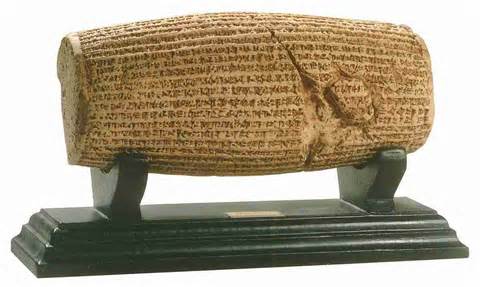
Many incomplete and flawed translations of the charter The Great Cyrus which is in the space of Tarkadeh(Internet) And many books are available; In fact, it is only a Persian translation of the English or French translations of the writings of this cylinder, which have many mistakes and flaws..
But Farhangistan decided to make an accurate and authentic version of the translation of this order available to everyone. This direct translation was compiled with the efforts of Prof. Abdul Majid Arfai and with the cooperation of Prof. Paul Richard Berger..
…
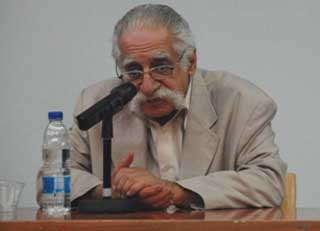
This charter can be divided into two parts. The first part is probably the words of a Babylonian person who explains the situation, and the second part is the words of Cyrus or a report of the words of Cyrus the Great..
Point of view of the Persians of Dej : That Babylonian tells about Marduk's misdeeds
Cylinder text The Great Cyrus
The first part:
١. ………[built] (؟)
٢. ……… corner of the world.
٣. ……… Great disrespect for Sarvari[١] His country was conquered[٢]
۴. ……… (He said by force) They should put the price of wheat and the fear of the herd on them[٣]
۵. (a place of worship) He built the same as Esangila … of for him ur and other holy places
۶. With rituals that are not suitable for them, the ritual of offering a sacrifice (before that) Was not. Every day he spoke rudely and humiliatingly, and also with a bad manner of humiliating (gods)[۴]
٧. Taking the offerings (To the temples) removed. [And (also) In rituals (Unfair ways) hand up. Sadness and unhappiness] To (= in) Join the holy cities. He removed the worship of Marduk, the king of the gods, from his heart.
٨. Someone who always goes to his city (= City of Marduk = Babylon Bābilion) Waste was allowed (And) everyday [to annoy (it) hand land (you write)His people] You destroy all of them with a restless yoke.
٩. Of their glory Enlil Gods (= Lord of the Gods = Marduk) He was very angry. [ Holy places were abandoned and monuments (it) Temples (= Works) It was forgotten]. Other gods reside among them (also) They left their places of worship.
١٠. At (equal to) His anger (= Marduk) And (= Nabūna'id) they (= figures of gods) took to Babylon. Lake Murdoch [That high-pitched song of war]for all the inhabitants of the earth whose places of life were destroyed,
١١. And (out of) The people of the lands of Sumer Šumer and Akkad Akkadî that (Like) [ body ] Dead (Inanimate) They had gone, he (= Marduk) Turn to them out of your own will and desire, and bring mercy to them and forgive them.
١٢. (Marduk) Among all the lands, he searched and explored, looking for the righteous king.[۵] As he wanted (= Marduk) Be it, the king who (To accept him) He took her hands in his.[۶]
١٣. And (= Marduk) Cyrus, the king of the city of Anshan, called Anšan by name (To reveal his invitation) and call him by name (out of) Kingdom over the whole world.
And (= Marduk) They said Qutî and all the soldiers were Manda (= females)،[٧] to obey him (= blindness) forced[٨] And (Marduk) -(forced to)- people, black heads,[٩] be defeated by Cyrus.
١۴. (while) And (= blindness) He shepherded them with truth and continuous giving, the great God, the guardian of his people, with joy in good deeds and heart. (full of) he gave ( = blindness) looked.
١۵. (So) He told him to go to his city, Babylon. (Marduk) And (= blindness) raised him to leave the road to Babylon (and himself) As a friend and companion, he always walked by his side.
١۶. (while) His countless troops[١٠] which is like (Drops) The waters of a river were not counted,[١١] dressed in battle gear,[١٢] They were walking beside him.
١٧. And (= Marduk) Without any campaign (= blindness) brought to his city, Babylon. (Marduk) Deliver Babylon from every misfortune (And) Nebonid Ra - the king who (= Marduk) did not worship- to his hand (= blindness) Surrender.[١٣]
١٨. All the people of Babylon, all of them (People) Sumer and Akkad (All of) Princes and rulers [١۴] To him (= blindness) They prayed and kissed his feet (And) Rejoicing in his kingdom, their faces shone.
١٩. A server with the help of the gods(؟) in danger of death (Set) They found life again and were freed from harm. (And) All the gods (؟) They praised him happily and honored his name.
Part II:
٢٠. I, Cyrus, the king of the world, the great king, the mighty king, the king of Babylon, the king of Sumer and Akkad, the king of the four corners of the world,
٢١. The son of Kamboja, the great king, the king (City) Anshan, the grandson of[١۵] Cyrus, the great king, the king (City) Anshan, the great-grandson of Chish Pish, the great king, the king (City) they
٢٢. From the seed of an eternal kingdom, the one whose kingdom is God[١۶] (= Marduk) And they love Nabû and want his kingdom for the joy of their hearts.
When I (= blindness)I asked for reconciliation in Babylon.[١٧]
٢٣. With joy and happiness in the palace of Shahriari, I will build my lordship, Marduk, the great lord, who gave the seal of my generous heart.[vested] Babylon is at will [save yourself] (So) I constantly tried to worship him every day.[١٨]
٢۴. (And when) Many soldiers[١٩] They were walking in friendship in Babylon, I didn't let anyone (in a place) be terrifying in all the lands of Sumer and Akkad.
٢۵. from (City) Babylon and all (other) I passed the holy cities in abundance. Helpers living in Babylon (don't write) He was yoked despite the wishes of the gods[٢٠] had been given (؟) not worthy of them,
٢۶. I solved their helplessness and freed them from poverty.[٢١]
Marduk, the great god was pleased with my deeds and
٢٧. (then) Me, Cyrus, the king who worships him, and Cambogia, my begotten child, and all my troops.
٢٨. With magnanimity, he added and we were happy, in full harmony, our deeds appeared beautiful in his eyes, and the highest foundation of[٢٢] [God] we praised. at his command (= Marduk) All the kings do not sit on Aurang Shahi
٢٩. and all (the Kings) the world[٢٣] from Zubrin Darya [high sea] (= Mediterranean Sea) to the bottom of the sea [lower sea] (= Persian Sea)، (All of) Residents of distant lands, all the kings of the Amorites,[٢۴] Residents in tents, all of them
٣٠. There are many of them[٢۵] on my behalf(= blindness); They brought me to Babylon and kissed my feet.
From … until the (City) Assyria Aššur and Susa MŬŠ. ERIN = Šusan
٣١. Agade, the land of Ešnunna, (City) fog land – Accused Mê – Turnu, late Dēr ta (the end) Noah said the earth and Niz (All of) The holy cities on the other side of the Tigris, which were ruined long ago,[٢۶] (I rebuilt it).
٣٢. (And also the figure) Gods in the middle of those cities (= places) I returned to the original places and (All those figures) Forever in place (their first) I sat down (And) All those people (who were scattered)I brought them back to their places.
٣٣. (And also the figure) Do not worship the gods of Sumer and Akkad (without fear) From the anger of the lord of the gods (= Marduk) He had brought it with Babylon, at the command of Marduk, the great god of joy and happiness
٣۴. I will sit in their places of worship - places where their hearts will be happy- May the gods take me to holy places (their first) I returned
٣۵. Every day before God (= Marduk) And they should ask me for a long life[٢٧] And let them always speak words at my feet, with words of good will, that they say to Marduk, my God, "To Cyrus, the king who (with fear) He worships you and Cambodia is his son.
٣۶. Rest assured, they will be productive until then … With days without any separation. All the people of Babylon honored the kingdom and I, all of them (People) I settled the lands in a peaceful habitat.
٣٧. One ? Goose, two ducks and ten moons (fat) more than (Fee Maamoul Daden) Geese, ducks and moons (I determined)
٣٨. loud and add to them. To turn firmly b[Nye ] Imgur – Enlil Imgur – Enlil" I tried the great wall of the city of Babylon[٢٨] And
39. Side wall (made of) The brick on the side of the ditch of the city (one of) former kings [ made and (the foundation) not done ] Was,
۴٠. [know that] on the periphery [City (to all) It had not come out]،[٢٩] What none of the previous kings (Despite the) The unemployed people [ his country ] They were not made in Babylon.
۴١. [ ….. from bitumen ] And I made bricks again and again [ Build it]ن[٣٠] [I did it.]
۴٢. [I built great wide gates for them ……. and cedar doors] With a cover of bronze, with thresholds and heels [Cast copper …… Wherever the gates]Ishan (was found)،
۴٣. [ I made it firm ………There is no tablet (In the vector) The name Ashur Bani Pal Aššur – baths – Shahi Pesh apli [٣١] from me [ Among it (= made) give]M.
۴۴. ………
۴۵. ……… Until the eternal day.
Footnotes :
[١] Using the word enūto "server" (Adjective from the Sumerian word EN meaning God, owner) It probably indicates that the primitive belief about the closeness between the vital power of the ruler and the progress and progress of the country was still prevalent among the Babylonian writers.. Quoted from the late professor "A. Leo Oppenheim"(A. Leo Oppenheim)
refer to :
Anceint Near Eastern Texts Related to Old Testament, ed. James B. Pritchard, 3rd ed. With Supplement (Priceton: Princeton University Press, 1696), P. 315, n. I
[٢] Literal meaning : was placed.
[٣] Before re-reading the tablet by Professor Paul Richard Berger, instead of the word (؟) buli has been reconstructed from tamšili and hence this line was translated as follows:
[«… Do not take the figures of the gods from their orangs ] (others) On it made up the figures (false) on them (= Orangs) place."
My transcription does not confirm the existence of bu and what remains is more similar to ši.
[۴] There are differences of opinion in reconstructing the end of line 6. In the reconstruction of the end of line 6, I have quoted the opinion of Shadran Oppenheim and the Assyrian culture of Chicago. In Assyrian Culture of Chicago (Assyrian Dictionary Chicago) The third volume D, page 11, number 3, under the word "dabābu", this phrase is reconstructed as follows.
Umišamma iddinibub šipr{I m}agritim
"Every day he talked about humiliating behaviors"
And this reconstruction is also evident in Professor Oppenheim's Shadran translation.
Mr. Professor Berger reconstructed this fracture "u ana magriti", which was discarded due to the lack of enough space for the word "ana" after re-examination by myself and Mr. Berger..
[۵] Literal meaning : Right, with piety
[۶] Shadervan Oppenheim has translated this part like this because the king must hold the hand of Lord Marduk during the New Year rituals. :
"The king who (In the akîtu New Year ritual) help him".
[٧] The word that has been returned to "Mad" has been read and translated as "Ummānmanda" of Mad and "Umman Manda" of Sepahians of Mad..
[٨] Literal meaning : He forced them to (against) Two feet pray.
[٩] The word "şalmat qaqqadi" which means black heads is a poetic metaphor for people in general due to being created by the gods and shepherds.- from the king.
[١٠] Literal meaning: In a wide way.
[١١] Literal meaning: Counting them is incomprehensible.
[١٢] Literal meaning: Their weapons are closed.
[١٣] Literal meaning: his hands (= the hands of Cyrus) from him (= don't write) filled.
[١۴] The word "šakkannakkî" which is returned here to "rulers", were local rulers, especially puppet princes who were appointed to rule in the conquered lands by the victorious king..
[١۵] Literal meaning: boy boy.
[١۶] The word "EN = bēl" in the absolute meaning of "God" is used only for God Marduk at this time..
[١٧] In the 17th year of Nabonidus, the armies of Cyrus in the month of Tašrîtu (Shahrivar- Seal of 539 BC) For the first time, the Babylonian army under the command of the son of Nabonidus defeats in a place called Opis. At this time, the people of Babylon (don't write) They start a rebellion, but Nebonid suppresses this rebellion with a terrible massacre. The 14th day of Tishritu ( October 10) The city of Sippar, sixty kilometers north of Babylon, was opened by Cyrus' troops. On the 16th day of Tishritu (= October 12) Gebreas, the commander of the Goti army (= Assyria) He enters Babylon through the Euphrates River bed and captures the city without bloodshed. The third day of the month of Arahsamnu (= 18 November) Cyrus comes to Babylon.
refer to : Sidney Smith
Sidney Smith, Babylonian Historical Texts Relating to the Capture and Downfall of Babylonian. London: Methuen and Co. Ltd. 1924
[١٨] Literal meaning: I searched.
[١٩] See footnote 10.
[٢٠] "Yogh" means alienation.
[٢١] The sentence "anhussn upasih usaptir sarbasunu" has been translated in different ways from that sentence:
a) Weissbach: I repaired the decay, had their collapse dug up
b) Schrader: I repaired her damage: I left her sarbu open
c) oppenheim: I brought relief to their dilpidated hausing, putting (thus) an end to their (main) complaints
A. Leo Oppenheim, Ancient Near Eastern Texts. P 316
d) Paul Richard Berger: I managed to recover from her exhaustion, let go of their burden
P. R. Berger “der Kyros – Cylinder with the additional fragment BIN II No. 32 and the Akkadian personal names in the Book of Daniel”. Zeitschrift fur Assyriologic, 64 (July, 1975), 199
e) The Assyrian Dictionary, Chicago, Vol. 1/11, p. 120, under the anhutu: I relieve their weariness, unfastening the ropes (they pulled)a
In this reference, instead of the word "sarbasunu", "sardisunu" is wrongly printed.
[٢٢] Literal meaning : First place.
[٢٣] Literal meaning : All inhabited lands.
[٢۴] The word Amurru "Amur", as it refers to a people who migrated to Mesopotamia from the west of the Euphrates River at the beginning of the second millennium BC, it also has the absolute meaning of "west", therefore a group of this word is used in this text. The West has also meant.
[٢۵] Literal meaning: Heavy.
[٢۶] Literal meaning: It had fallen down, it had been abandoned.
[٢٧] Literal meaning : to talk.
[٢٨] See subtitle 16.
[٢٩] Literal meaning: It did not cause the fence to be completely closed.
[٣٠] Literal meaning: [ His work]ن.
[٣١] Literal meaning : The king who has gone before me.
The theme:
The decree of Cyrus the great by the efforts of Abdul Majid Arfai, Iran Academy of Literature and Art, number 9, 1366 – With a little pseudonym
Thanks from:
Ariabum website – The online version of Koresh Bozor's decree has been published for the first time in the Aryabum research database by the efforts of Abdul Majid Arfai..
Tarngar is anti-pan-Turkish
Iranboom website
—
Taken from Ahura Campus


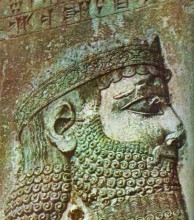
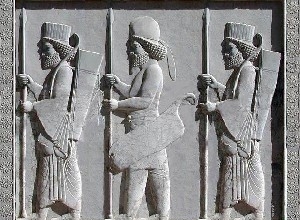
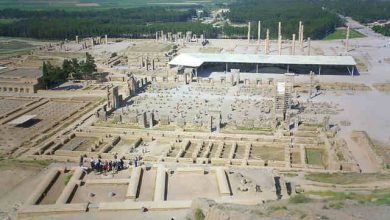

Excellent, thank you for all your patience in improving knowledge
Thank you for your kindness, Reza Jan, it is because of your grace that we continue our journey with strength
I congratulate you on your entry to Parsian Dej users
To change the name, you can refer to the profile editing section
It doesn't matter when you change because it will automatically apply to all your views and activity(name change)
Thank you, I enjoyed it a lot, but I wanted to know what the declaration of human rights that they say is the bottom of this cylinder, you did not name it, I would be grateful if you could answer
Sorry, I don't understand what you mean?
Thank you;
We always visit your website and benefit from your useful writings;
be successful.
Thank you, dear Milad
Be victorious and proud
درود
سرانجام من یه جا ترجمه دقیق منشور کوروش بزرگ رو خوندم که بتونم به صحتش اطمینان داشته باشم واونجا جایی نبود جز “پارسیان دژ”….!!!
Thank you very much
درود
I am very glad that it was noticed by you
Parsian Dej makes every effort to collect the most authentic materials
And with your seal, users of Parsian Dej, we will definitely continue our journey with more strength …
درود
شرمنده.انگار تو دیدگاهم فراموش کردم نامم رو بنویسم.
I also hope that you will progress more and more in your endeavors.
good luck
Thank you, Aryan lady, for sharing your opinion and strengthening our hearts
Thank you